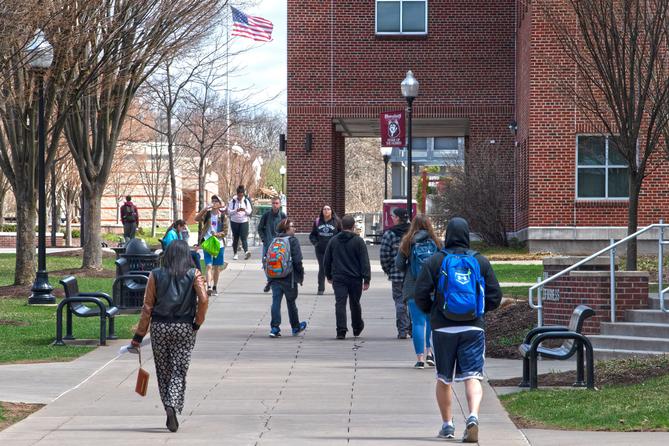Spotlight PA is an independent, nonpartisan newsroom powered by The Philadelphia Inquirer in partnership with PennLive/The Patriot-News, TribLIVE/Pittsburgh Tribune-Review, and WITF Public Media. Sign up for our free newsletters.
HARRISBURG — Pennsylvania’s governor has wide power to propose education funding, serve on university boards, and appoint trustees to those critical panels.
Democratic Gov. Tom Wolf, for example, sent $40 million of unused stimulus money to four universities this summer, a decision he could make without the input of the General Assembly.
In November, voters will select a new governor — the two frontrunners for the seat being Democrat Josh Shapiro, the state’s attorney general, and Republican Doug Mastriano, a state senator representing Franklin County.
To see how the two top candidates differ on issues related to higher education in Pennsylvania, Spotlight PA asked each campaign for information and reviewed previous statements, votes, or policy positions. Shapiro’s campaign responded with information. Mastriano’s campaign did not reply.
Here is where the two candidates stand:
Vision for Pa.’s colleges and universities
Pennsylvania’s State System of Higher Education, or PASSHE, is made up of 14 universities and educates more than 93,000 students. The governor, with state Senate approval, appoints 11 of the state system’s 20 board members, who have the power to appoint university presidents, set tuition, and oversee other financial decisions.
The governor and the person they pick to be the state’s secretary of education serve on the board as well. Both roles can choose designees as stand-ins.
In 2016, PASSHE began a redesign to cut costs and promote financial stability and access. In October 2021, the system asked the state for an additional $73 million, for a total of $550 million.
As a state senator, Mastriano voted to send nearly $552.5 million to the state system this summer. His campaign website makes no mention of his plans for the state system.
In a statement to Spotlight PA, Shapiro’s campaign said he plans to increase investment in PASSHE schools and work to make community college more affordable.
“As Governor, Josh will champion legislation that lowers costs, increases access to community colleges and state-related universities, and funds resources for more low-income students to take part in the economy,” the campaign wrote. “He will invest more in PASSHE schools, make community college more affordable, and ensure all our students have ample opportunities to succeed.”
The Association of Pennsylvania State College and University Faculties, the union representing faculty and coaches at PASSHE schools, endorsed Shapiro for governor.
State appropriations for state-related universities
The state also appropriates funds for Pennsylvania’s four state-related universities — The Pennsylvania State University, the University of Pittsburgh, Lincoln University, and Temple University. The state-related schools have less state oversight and are more autonomous than the PASSHE system.
The governor serves on each of the state-related boards and appoints other trustees to serve as well.
In July, Mastriano was among seven senators who voted against providing funding for state-related universities. State House Republicans had opposed funding the University of Pittsburgh because of the school’s research involving fetal tissue.
Later, Mastriano sent a letter to the leaders of the four state-related universities asking them to reconsider raising tuition in light of inflation and a special appropriation coming from the governor. “Pennsylvania’s families simply cannot afford a tuition hike in addition to the rising costs in other parts of the economy,” he wrote.
All four state-related universities have raised tuition in the past year.
Shapiro, during an August visit to State College, said he supports more funding for state-related universities but also said those institutions should not raise tuition.
“We are 48th in the nation for what we invest in higher ed. We need to show that we care about investing in higher ed,” Shapiro said, according to reporting from StateCollege.com.
The United Steelworkers District 10, the union that represents Pitt faculty, endorsed Shapiro for governor.
Transparency for state-related universities
State-related status exempts the universities from most of the open records provisions PASSHE schools face, apart from reporting some basic financial information and the university’s top 25 salaries.
As a state senator, Mastriano sponsored a bill that would lessen those exemptions for state-related universities. The measure would require the schools to make public 175 more of its top salaries, staffing information by position, financial information for individual academic units, and university contracts of more than $10,000, among others.
Mastriano’s bill passed the Senate 38-12 in September and was sent to the state House for consideration.
In a statement to Spotlight PA, Shapiro’s campaign said the Democratic candidate supports Mastriano’s bill. The campaign said Shapiro, who is the father of a Pitt student, is committed to increasing transparency at state-related universities to measure results and better track state funding.
College debt forgiveness
As attorney general, Shapiro supported President Joe Biden’s proposal to make community college free and make four-year public universities or colleges free for students from families who earn less than $125,000.
In a March 2021 letter to the administration, Shapiro wrote he would “welcome President Biden’s commitment to consider using executive authority to cancel student debt.”
Mastriano, as part of his July appeal to state-related universities to freeze tuition, argued that “unsustainable student loan borrowing costs places the dream of a college degree further and further out of reach for many families.”
The state senator characterized Biden’s move to forgive up to $20,000 in student loans as “irresponsible government spending.”
WHILE YOU’RE HERE… If you learned something from this story, pay it forward and become a member of Spotlight PA so someone else can in the future at spotlightpa.org/donate. Spotlight PA is funded by foundations and readers like you who are committed to accountability journalism that gets results.

